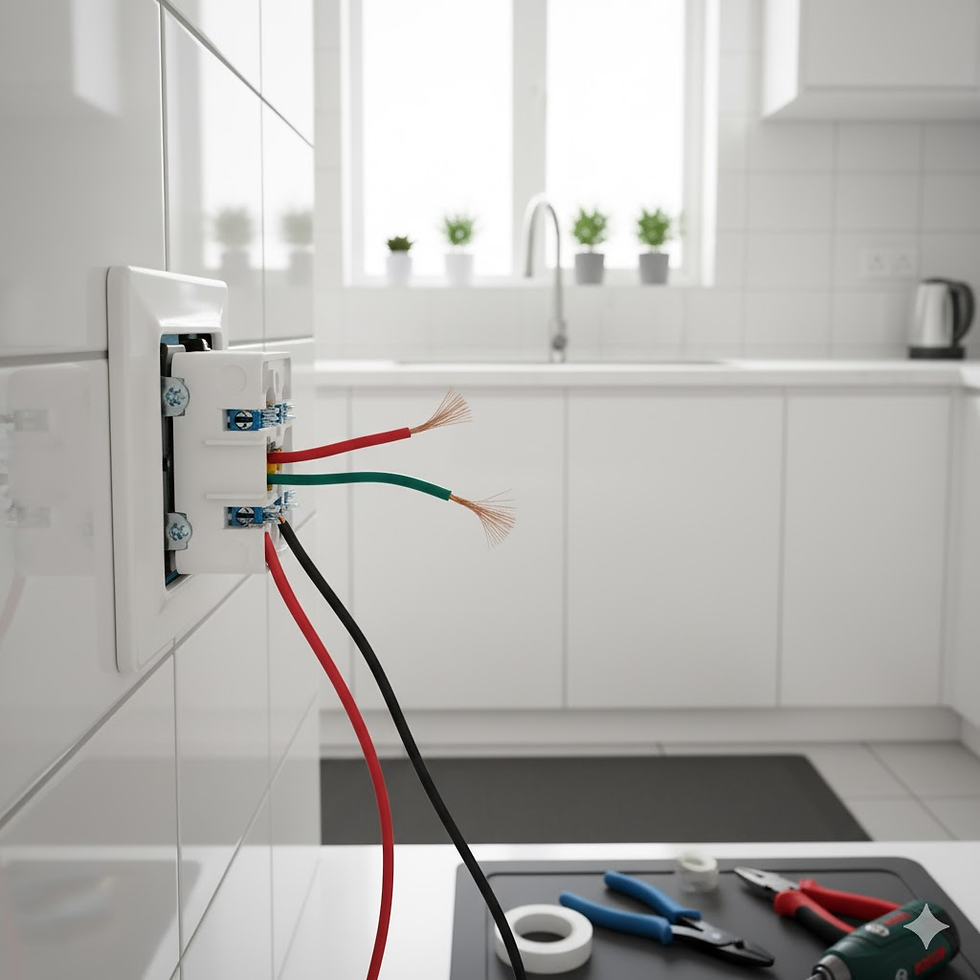How to Install a 13A Socket Yourself — Or When to Call a Certified Electrician
- Nabihah
- Nov 5, 2025
- 3 min read
Index

Introduction
Got a faulty or not enough 13A socket at home? You might think of installing it yourself — but there are risks if you're not careful.
The 13A socket is the most common type of electrical outlet used in Malaysian homes. It’s used for appliances like TVs, refrigerators, fans, chargers, and more. This article will guide you on how to safely install a 13A socket, and when it’s best to leave it to the professionals.

1. What Is a 13A Socket and Its Uses?
A 13A socket refers to a 3-pin outlet rated at a maximum current of 13 amperes. It is typically used for:
Common household appliances (TVs, computers, rice cookers)
Permanent installation on walls in homes or offices
⚡ This type of socket must be properly connected to the main switch and grounding wire (earthing) for safety.
2. Safety Steps Before Installing a New Socket
🛑 Don’t skip these steps:
Switch off the main breaker (MCB) before starting work
Use a tester to confirm there’s no electrical current
Prepare tools like screwdriver, wires, and terminal block
Wear safety gloves
Note: If you’re unfamiliar with electrical wiring, it’s best to get help from a licensed electrician.
3. How to Install a 13A Socket at Home
Quick steps:
Identify the 3 types of wires:
Live (Red / Brown)
Neutral (Blue / Black)
Earth (Green Yellow)
Connect to the socket terminals:
L to Live
N to Neutral
E to Earth
Tighten the screws and close the socket casing
Turn the MCB back on and test the socket
⚠️ If the MCB trips after installation, there is a wiring error — stop and call an expert immediately..

✅ Call a professional if:
You want to install more than one socket (requires additional wiring)
There is no earthing connection in your old house
Installation is in the bathroom or wet areas
MCB trips frequently when the socket is used
You’re unsure of the wiring diagram
🎓 A licensed electrician will ensure everything complies with Energy Commission safety standards.

5.Risks of Improper Installation
🚨 Risks of incorrectly installed 13A sockets include:
Electrical fires from short circuits
Electric shocks to users
Current leakage that may damage home appliances
No overload protection if no fuse is installed
💡 Don’t compromise on safety — always follow installation specifications.
Conclusion
Installing a 13A socket might seem easy, but it must be done carefully and safely. If in doubt, it's better to let a certified electrician handle it to avoid long-term risks.
Need to add new sockets, install light switches, water heaters, or ceiling fans? We’re ready to help with affordable prices and neat, professional work.
Frequently Asked Questions (FAQ)
Q: Can I add a new socket using existing wires?
A: Not recommended. Each socket should have its own connection according to safety standards.
Q: Why is my old socket hot when using appliances?
A: Possibly due to loose wiring or a damaged socket. It should be replaced.
Q: Do I need a permit for house wiring work?
A: Not for small jobs. But major works like DB board installation or full rewiring require a permit.
Q: Is a 13A socket suitable for a water heater?
A: No. Water heaters usually need a 20A switch with dedicated wiring.
Q: Can I use an extension plug instead?
A: Temporarily, yes. But not for long-term use — it poses a high overload risk.
⚡ Want to add sockets, install lights, ceiling fans, DB boards or grounding systems? We offer:
✅ Affordable Prices & Materials Included
✅ Registered & Experienced Technicians
✅ Neat & Safe Workmanship









Comments